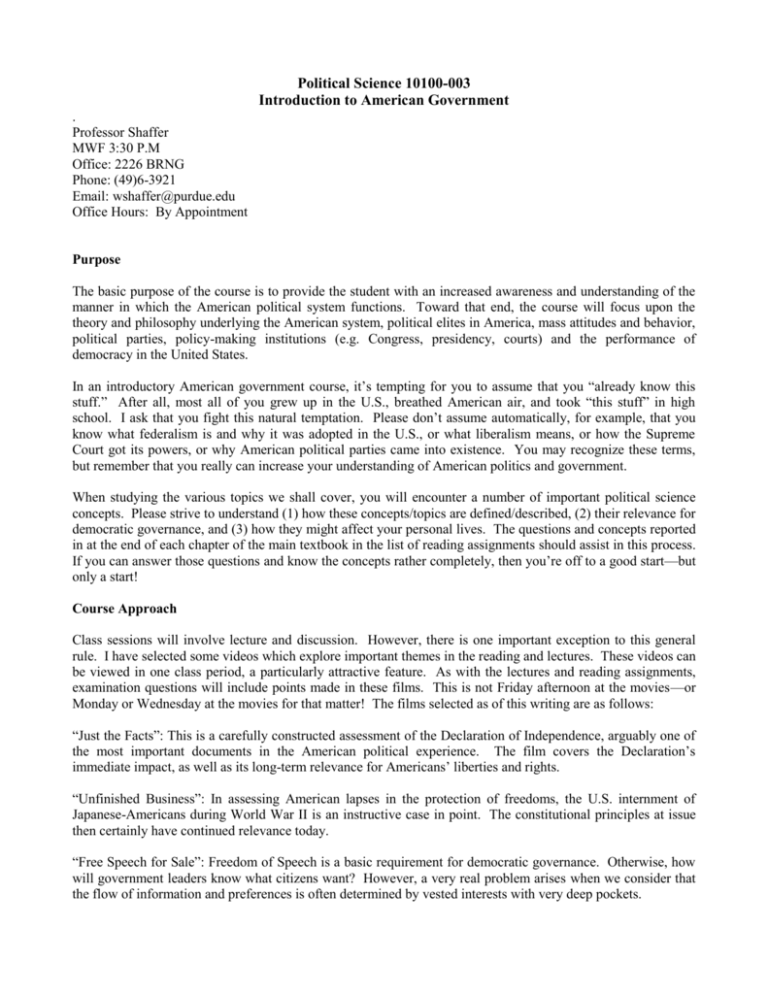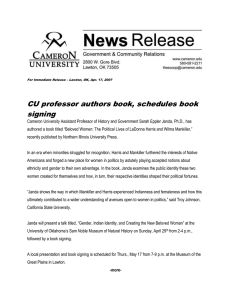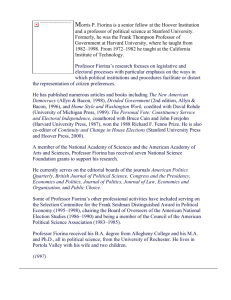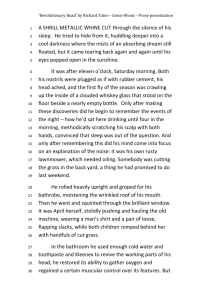
Political Science 10100-003
Introduction to American Government
.
Professor Shaffer
MWF 3:30 P.M
Office: 2226 BRNG
Phone: (49)6-3921
Email: wshaffer@purdue.edu
Office Hours: By Appointment
Purpose
The basic purpose of the course is to provide the student with an increased awareness and understanding of the
manner in which the American political system functions. Toward that end, the course will focus upon the
theory and philosophy underlying the American system, political elites in America, mass attitudes and behavior,
political parties, policy-making institutions (e.g. Congress, presidency, courts) and the performance of
democracy in the United States.
In an introductory American government course, it’s tempting for you to assume that you “already know this
stuff.” After all, most all of you grew up in the U.S., breathed American air, and took “this stuff” in high
school. I ask that you fight this natural temptation. Please don’t assume automatically, for example, that you
know what federalism is and why it was adopted in the U.S., or what liberalism means, or how the Supreme
Court got its powers, or why American political parties came into existence. You may recognize these terms,
but remember that you really can increase your understanding of American politics and government.
When studying the various topics we shall cover, you will encounter a number of important political science
concepts. Please strive to understand (1) how these concepts/topics are defined/described, (2) their relevance for
democratic governance, and (3) how they might affect your personal lives. The questions and concepts reported
in at the end of each chapter of the main textbook in the list of reading assignments should assist in this process.
If you can answer those questions and know the concepts rather completely, then you’re off to a good start—but
only a start!
Course Approach
Class sessions will involve lecture and discussion. However, there is one important exception to this general
rule. I have selected some videos which explore important themes in the reading and lectures. These videos can
be viewed in one class period, a particularly attractive feature. As with the lectures and reading assignments,
examination questions will include points made in these films. This is not Friday afternoon at the movies—or
Monday or Wednesday at the movies for that matter! The films selected as of this writing are as follows:
“Just the Facts”: This is a carefully constructed assessment of the Declaration of Independence, arguably one of
the most important documents in the American political experience. The film covers the Declaration’s
immediate impact, as well as its long-term relevance for Americans’ liberties and rights.
“Unfinished Business”: In assessing American lapses in the protection of freedoms, the U.S. internment of
Japanese-Americans during World War II is an instructive case in point. The constitutional principles at issue
then certainly have continued relevance today.
“Free Speech for Sale”: Freedom of Speech is a basic requirement for democratic governance. Otherwise, how
will government leaders know what citizens want? However, a very real problem arises when we consider that
the flow of information and preferences is often determined by vested interests with very deep pockets.
POL 10100-3 American Govt, Fall 2013
Prof Shaffer
Page 2
In The Warning, veteran FRONTLINE producer Michael Kirk unearths the hidden history of the nation's worst
financial crisis since the Great Depression. At the center of it all he finds Brooksley Born, who speaks for the
first time on television about her failed campaign to regulate the secretive, multitrillion-dollar derivatives market
whose crash helped trigger the financial collapse in the fall of 2008.
Scalia and O’Connor interviews: Antonin Scalia is a sharp-witted conservative justice on the U.S. Supreme
Court, while Sandra Day O’Connor was more of a centrist during her tenure on the Court. These interviews will
convey the importance of the ideologies justices bring to their decisions on constitutional principles.
Attendance
Overall, attendance is a good thing. Why? The answer is two-fold: (1) Not all material is covered in the
reading, and (2) as Woody Allen once quipped, “half of life is just showing up.” So, why am I not taking
attendance in this class? After all, it is quite clear that a higher percentage of students come to class when
attendance is taken and given some weight in the final grade. Therefore, I am assigning a small weight to
attendance in your overall grade.
Mutual Respect
Students will ask questions or state an opinion on a range of topics. There is an old expression to the effect that
one should discuss anything other than religion or politics, and the reason is simple—people feel passionately
about those two topics. As a result, sometimes debate can be heated, and even become downright nasty, even
personally nasty. You have the right to hold and express whatever opinions you like, no matter how
unacceptable they may seem to your classmates. They can disagree with you, even vehemently, but they must
accord you proper respect. Likewise, you must respect their right to express their views freely. By the way, no
one will be graded on the basis of their personal political attitudes, regardless of the content of those opinions.
Reading Assignments
Why, you may ask, should I complete the readings the week they are assigned? He’s not going to know, and I
can read all the stuff before the exam. My answer is two-fold: (1) I think you will absorb more of the material,
and (2) it will make rereading and reviewing the material for exams more productive. Simply stated, we seek to
convey a knowledge base for some of the most important features of the American political system. We can
achieve this primary goal only if you immerse yourself in the reading material, incorporate material from class
sessions, and master the subject matter in preparation for exams.
Essay
Late in the semester an essay assignment will be completed. More on that as the semester unfolds.
Academic Integrity
Academic dishonesty will not be tolerated. For purposes of this course, we are talking about any form of
cheating on the exams. It is the policy of the instructor to assign an F to anyone caught cheating on an exam.
Violations will be reported to the Dean of Students, accompanied by a recommendation that the student be
reprimanded by the Dean of Students. For a general review of Purdue University’s policy on academic
integrity, please read Purdue’s policy at this link:
http://www.purdue.edu/odos/osrr/academicintegritybrochure.php We are all expected to adhere to
Purdue’s policy on academic integrity.
POL 10100-3 American Govt, Fall 2013
Prof Shaffer
Page 3
Required Books
Kenneth Janda, Jeffrey M. Berry , Jerry Goldman and Kevin W. Hula. 2013. The Challenge of Democracy:
American Government in a Global World, 9th ed. Brief Edition. Boston: Wadsworth, Cengage Learning.
[paperback]
Morris P. Fiorina. 2011. Culture War? The Myth of a Polarized American, 3rd ed. New York: Pearson
Longman. [paperback]
Yates, Michael D. 2009. Why Unions Matter. New York: Monthly Review Press. [paperback]
Examination Dates
Exam #1:
Exam #2:
Exam #3:
Friday, September 20
Friday, October 25
To Be Announced
Grading
Examination #1
Examination #2
Examination #3
Essay
Participation
Total
25%
25%
25%
15%
10%
100%
Reading Assignments
August 19-23:
Theories of Governance
Janda, et.al., Chapter 14
Fiorina, Chapter 1
August 26-30:
Political Culture
Janda, et.al., Chapter 1
Fiorina, Chapters 2-3
September 2-6:
Origins And Development Of Government Structure
Janda, et.al., Chapter 2
Fiorina, Chapter 4
POL 10100-3 American Govt, Fall 2013
Prof Shaffer
Page 4
SEPTEMBER 2:
Labor Day
September 9-13:
Federalism
Janda, et.al., Chapter 3
Fiorina, Chapter 5
September 16-20:
Civil Liberties
Janda, et.al., Chapter 12
Fiorina, Chapter 6
Examination #1: Friday, September 20
September 23-27:
Civil Rights
Janda, et.al., Chapter 13
Fiorina, Chapters 7-8
Sept. 30-Oct.4:
Public Opinion
October 7-11:
Janda, et.al., Chapter 4, pp.111-130
Fiorina, Chapter 9
The News Media
Janda, et.al., Chapter 4, pp.130-146
Fiorina, Chapter 10
Yates, Introduction and Chapter 1
October 7-8:
OCTOBER BREAK
October 14-18:
Political Parties
Janda, et.al., Chapter 6
Yates, Chapter 2
October 21-25:
Campaigns And Elections
Janda, et.al., Chapter 5
Yates, Chapter 3
POL 10100-3 American Govt, Fall 2013
Prof Shaffer
Page 5
Examination #2: Friday, October 25
Oct. 28-Nov. 1:
Interest Groups
November 4-8:
Janda, et.al., Chapter 7
Yates, Chapter 4
Congress
Janda, et.al., Chapter 8
Yates, Chapter 5
November 11-15:
The Presidency
Janda, et.al., Chapter 9
Yates, Chapter 6
November 18-22:
The Bureaucracy
Janda, et.al., Chapter 10
Yates, Chapter 7
Essay Paper: Friday, November 22
November 25-29:
The Federal Courts
Janda, et.al., Chapter 11
NOVEMBER 27-29:
December 2-6:
THANKSGIVING
Some Final Thoughts
Fiorina, Chapter 11
Yates, Chapter 8
Examination #3: TBA






